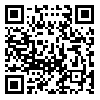BibTeX | RIS | EndNote | Medlars | ProCite | Reference Manager | RefWorks
Send citation to:
URL: http://journal.zums.ac.ir/article-1-1301-en.html

 , Mohammad hosein Yazdi2
, Mohammad hosein Yazdi2 
 , Zuhair Mohammad Hassan3
, Zuhair Mohammad Hassan3 
 , Marzieh Holakuyee4
, Marzieh Holakuyee4 
 , Taraneh Abedi Mohtasab2
, Taraneh Abedi Mohtasab2 
 , Farzaneh Aminharaty2
, Farzaneh Aminharaty2 
 , Solmaz Agha Amiri2
, Solmaz Agha Amiri2 
 , Mehdi Mahdavi3
, Mehdi Mahdavi3 

2- Dept. of Pathobiology, School of Public Health, Tehran University of Medical Sciences, Tehran, Iran.
3- Dept. of Immunology, Faculty of Medical Sciences, Tarbiat Modares University, Tehran, Iran
4- Dept. of Mycology, Faculty of Medical Sciences, Tarbiat Modares University, Tehran, Iran.
Background and objective: Antitumor effect of lactic acid bacteria have been shown in many studies, this effect maybe due to the immunomodulatory properties of these bacteria. In present work we have studied the effect of Lactobacillus (L) acidophilus on the immune responses of BALB/c mice against transplanted tumor derived from breast tissue. Materials and Methods: 6-8 week-old in-bred BALB/c mice, each weighing 25–30 g, were used. The mice were divided into two groups each consisted of 9 mice as test and control groups. The L.acidophilus ATCC4356 strain was used in this study. It was inoculated in MRS agar and cultivated overnight under anaerobic conditions then collected and resuspended in PBS. After preparation of proper amount of this suspension it was orally (2.7 × 108 CFU/ml) administered to the mice with a gastric feeding 2 weeks before tumor transplantation and 3 weeks after that, with 3 days break and 7 days administration. The control mice received an equal volume of PBS during the study. Results: Results of the present work showed that L.acidophilus can increase the production of immunomodulatory cytokine IL-12 and decrease the TGF-β which can suppress immune response. Moreover, the growth rate of tumor in group which received L.acidophilus were decreased and the results of delayed type hypersensitivity (DTH) of this group in 48h were better than control group. Conclusion: The results of our study suggest that daily use of L.acidophilus can regulate immune response with Th1 dominance and may be helpful for cancer immunotherapy, but further studies are needed to investigate the other mechanisms of this effect.
Received: 2010/11/21 | Accepted: 2014/06/23 | Published: 2014/06/23
| Rights and permissions | |
 |
This work is licensed under a Creative Commons Attribution-NonCommercial 4.0 International License. |


